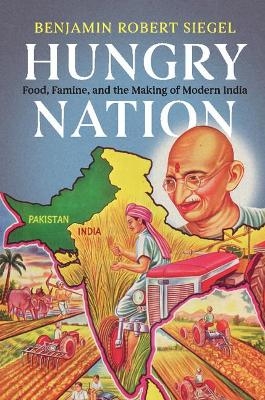
Hungry Nation
Food, Famine, and the Making of Modern India
Seiten
2018
Cambridge University Press (Verlag)
978-1-108-44196-4 (ISBN)
Cambridge University Press (Verlag)
978-1-108-44196-4 (ISBN)
The story of independent India's struggle to overcome famine and malnutrition in the twentieth century. Weaving together the voices of politicians, planners, and citizens, this ambitious account traces Indian nation-building through questions of food and famine, and explains the origins of contemporary India's hunger and malnutrition epidemic.
This ambitious and engaging new account of independent India's struggle to overcome famine and malnutrition in the twentieth century traces Indian nation-building through the voices of politicians, planners, and citizens. Siegel explains the historical origins of contemporary India's hunger and malnutrition epidemic, showing how food and sustenance moved to the center of nationalist thought in the final years of colonial rule. Independent India's politicians made promises of sustenance and then qualified them by asking citizens to share the burden of feeding a new and hungry state. Foregrounding debates over land, markets, and new technologies, Hungry Nation interrogates how citizens and politicians contested the meanings of nation-building and citizenship through food, and how these contestations receded in the wake of the Green Revolution. Drawing upon meticulous archival research, this is the story of how Indians challenged meanings of welfare and citizenship across class, caste, region, and gender in a new nation-state.
This ambitious and engaging new account of independent India's struggle to overcome famine and malnutrition in the twentieth century traces Indian nation-building through the voices of politicians, planners, and citizens. Siegel explains the historical origins of contemporary India's hunger and malnutrition epidemic, showing how food and sustenance moved to the center of nationalist thought in the final years of colonial rule. Independent India's politicians made promises of sustenance and then qualified them by asking citizens to share the burden of feeding a new and hungry state. Foregrounding debates over land, markets, and new technologies, Hungry Nation interrogates how citizens and politicians contested the meanings of nation-building and citizenship through food, and how these contestations receded in the wake of the Green Revolution. Drawing upon meticulous archival research, this is the story of how Indians challenged meanings of welfare and citizenship across class, caste, region, and gender in a new nation-state.
Benjamin Robert Siegel is Assistant Professor of History at Boston University. In 2014, he won the Sardar Patel Award for 'the best doctoral dissertation on any aspect of modern India'.
1. The Bengal famine and the nationalist case for food; 2. Independent India of plenty; 3. Self-help which ennobles a nation; 4. The common hunger of the country: merchants and markets in plenty and want; 5. All the disabilities which peasant and land can suffer; 6. The ideological origins of the Green Revolution; Conclusion. Landscapes of hunger in contemporary India.
| Erscheinungsdatum | 18.06.2018 |
|---|---|
| Zusatzinfo | Worked examples or Exercises; 12 Halftones, black and white |
| Verlagsort | Cambridge |
| Sprache | englisch |
| Maße | 150 x 229 mm |
| Gewicht | 500 g |
| Themenwelt | Geisteswissenschaften ► Geschichte ► Regional- / Ländergeschichte |
| Geschichte ► Teilgebiete der Geschichte ► Kulturgeschichte | |
| Sozialwissenschaften | |
| ISBN-10 | 1-108-44196-3 / 1108441963 |
| ISBN-13 | 978-1-108-44196-4 / 9781108441964 |
| Zustand | Neuware |
| Haben Sie eine Frage zum Produkt? |
Mehr entdecken
aus dem Bereich
aus dem Bereich
der stille Abschied vom bäuerlichen Leben in Deutschland
Buch | Hardcover (2023)
C.H.Beck (Verlag)
23,00 €
vom Mittelalter bis zur Gegenwart
Buch | Softcover (2024)
C.H.Beck (Verlag)
12,00 €


